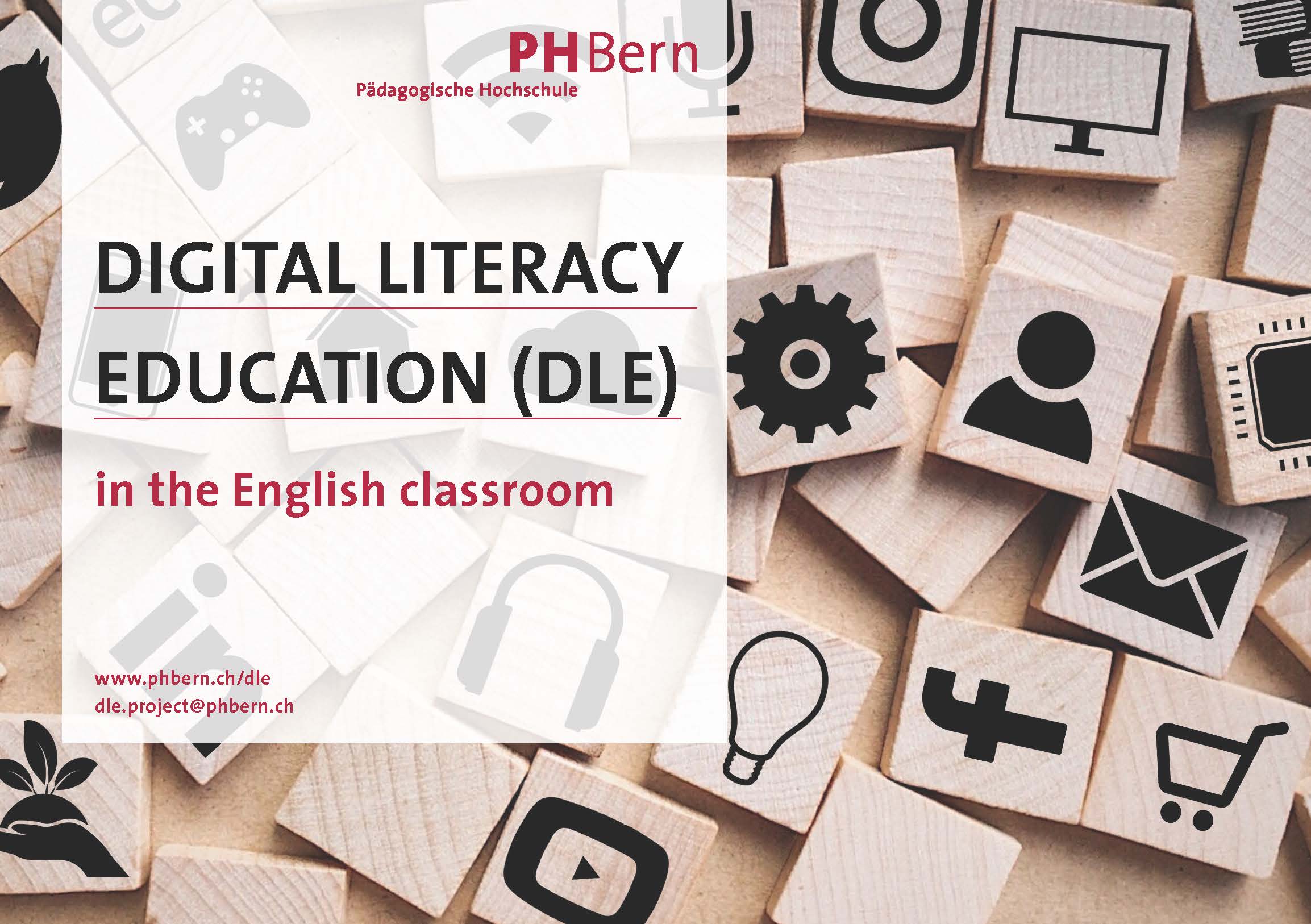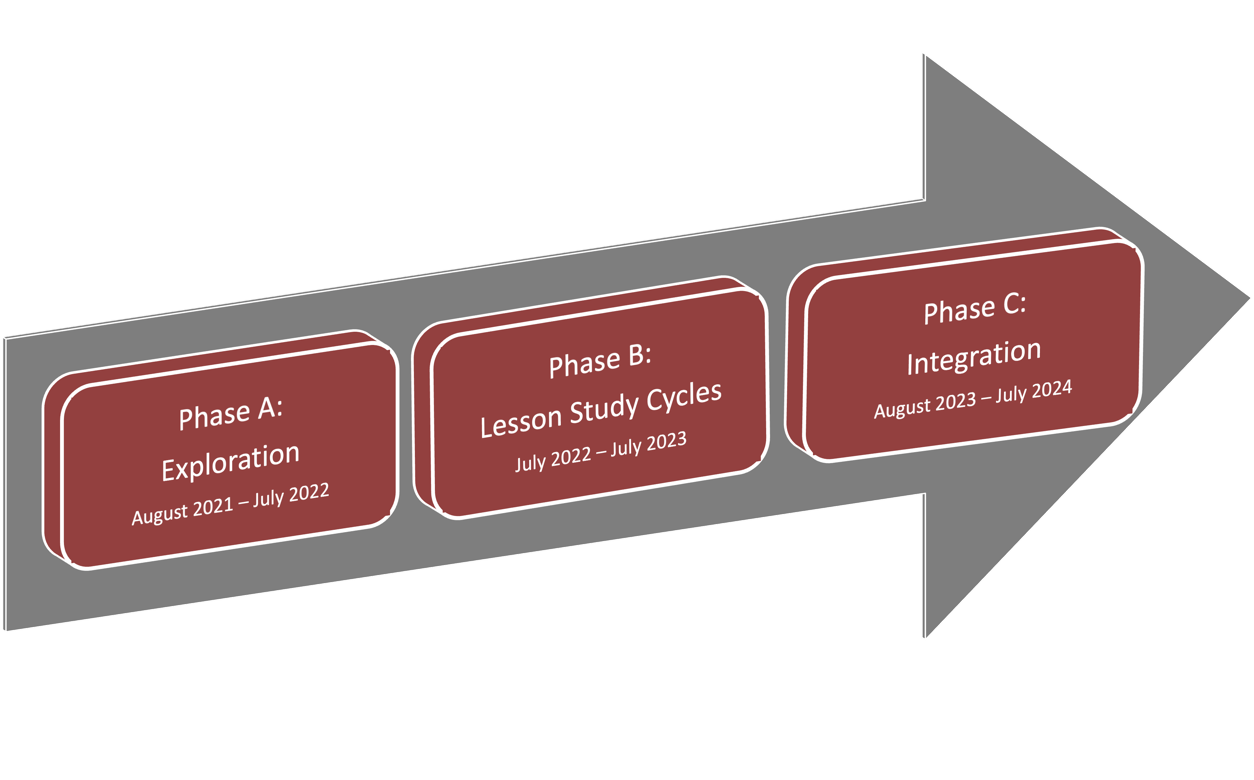
The Digital Literacy Education (DLE) project is an explorative project in which we are mainly interested in gaining insight into how Swiss upper secondary English teachers and their students perceive digital literacy and its place in the EFL-classroom. While digital literacy is a set of transversal skills in nature, we are interested in how digital literacy education is integrated in a subject-specific context. We focus on the English classroom because English is the lingua franca of the internet, and we see it as an integral stepping-stone on the path towards digital literacy.
Currently we are looking for teachers who are interested to participate in our project.
How do I benefit from participating in the project?
Teachers participating will have the chance to actively engage with their own practice of integrating digital literacy into their classrooms:
- They will be invited to choose from a set of materials and innovative ideas.
- They will gain a multi-perspective view of their own teaching practice.
- They will be able to try out innovative teaching sequences in their classrooms.
- They will be invited to add their own research question(s) to the study.
- They can further develop their own professional expertise.
For teachers, participating in the study is equivalent to completing a further education course that they can simply integrate into their normal workday.
How do my students benefit from participating in the project?
Today’s youth have been immersed in digital technologies from an early age. Therefore, they are often called digital natives, presuming that they are highly digitally literate. However, recent findings on Swiss upper secondary students’ skills regarding specific subdimensions of digital literacy have revealed disconcerting results (Stanoevska-Slabeva, Mueller, Lippe, et al., 2015; Stanoevska-Slabeva, Mueller, Seufert, et al., 2015). It seems as if adolescents are not as digitally literate as one might expect. In fact, we only know little of their real learning needs on specific sets of digital skills. In our study, students will be asked to deliver their viewpoint on digital literacy education. By doing so, the study contributes to a deeper understanding of students’ perspectives and needs in the field of digital literacy. Based on the research findings, teachers can more accurately align their instruction with students' learning needs.
1. How does it work? What’s the method of research?
The project is based on a design-based research approach. Thus, the participating teachers will have the opportunity to become researchers by immersing themselves in the method of lesson-study cycles. Participating teachers will be offered instructional materials from which they can choose, experiment with, and thus widen their professional expertise on subject-integrated digital literacy education. Since we believe schoolwork to be a co-constructivist endeavor, students will be involved in the lesson studies as well. Researchers will support the teachers during the whole process by developing a range of materials, delivering evaluative instruments, supporting teachers in the administration of evaluative tools, organizing reflective meetings, etc. During the lesson-study cycles, data will be collected from different sources and perspectives, i.e. from teachers and their students.
2. How is the project organized?
The project is structured in three phases, A-C, as depicted below in Figure 1:

In Phase A, English Gym1-teachers and students from Bernese upper secondary schools (Gymnasien) will be interviewed on their beliefs about digital literacy education in general and, more specifically, in a subject-specific setting. The interviews will be conducted in January and February 2022.
To get an authentic insight into the subject-specific integration of digital literacy education, in Phase B, teachers are invited to participate in lesson-study cycles. In this part of the project, teachers will have the opportunity to add their own research interests to the study. Phase B starts in late June 2022.
While the data collected will be analyzed continuously throughout the project, Phase C will enable the researchers to make use of the findings in a more integral approach, to understand and examine the phenomena thoroughly and to generate a well-rounded synthesis.
3. What is design-based research?
The hands-on research approach taken in this study (Phase B) is guided by the following principles of design-based research as summarized by Anderson & Shattuck (2012):
- The research activity is situated in an authentic school setting: Teachers plan and reflect on lesson-study cycles as part of their very regular classroom work.
- The focus is placed on an instructional intervention, which is also tried out: Teachers use a selection of tasks from the material pool in their lessons. In contrast to classical intervention research, however, this study focuses on an exploratory look at the didactic utilization of the teaching resources.
- Use of multiple methods: In the study as a whole, but also in Phase B alone, methodological approaches are mixed (e.g., questionnaires with students, inclusion of teachers' planning documents, interview protocols).
- Iterative approach: The design of the study is such that multiple lesson-study cycles will be conducted over the course of Phase B.
- Collaborative partnership between researchers and teachers and students: Researchers actively integrate teachers into the research process.
- Development of design or instructional principles: This aspect certainly also plays a role in the present study, but it is not the main focus. With regard to the material and task stimuli provided, it is nevertheless possible to derive from the data and findings generated which stimuli must be designed and in what form, so that teachers and their students can perceive and use them as productive learning opportunities for the acquisition of digital literacy.
If you would like to know more about design-based research, please have a look at these resources:
Anderson, T., & Shattuck, J. (2012). Design-based research: A decade of progress in education research? Educational Researcher, 41(1), 16–25. https://doi.org/10.3102/0013189X11428813
Kelly, A. E., Lesh, R. A., & Baek, J. Y. (2018). Enabling innovations in education and systematizing their impact. In Handbook of design research methods in education: Innovations in science, technology, engineering, and mathematics learning and teaching (Special Indian Edition, pp. 3–18). Routledge.
4. How does a lesson-study cycle work?
The method of lesson-study cycles (Dudley 2016) is often used to further develop instructional quality (also in contexts of teachers’ continuing education) or to accompany the implementation of educational innovations. From a design research perspective, we would like to move beyond the examination of a particular instructional design. Instead, we aim to view the lesson-study process from a meta-perspective (Kelly et al., 2018). Thus, we are rather interested in examining the processes of instructional planning, teaching, and reflecting on one’s own teaching (cf. Figure 2).

If you would like to learn more about the lesson-study cycle or about design-based research as a methodological approach in educational sciences, you can check out the following resources:
Dudley, Pete. (2014). Lesson study workbook. [https://lessonstudy.co.uk/new-lesson-study-workbook-free-to-download/], assessed August 28th, 2020.
Dudley, Peter. (2016). Lesson study: Professional learning for our time. London: Routledge.
Mewald, C., & Rauscher, E. (2019). Lesson Study: Das Handbuch für kollaborative Unterrichtsentwicklung und Lernforschung. Innsbruck: StudienVerlag.
5. Are you interested in learning more?
Here are some further reading recommendations:
Stanoevska-Slabeva, K., Mueller, S., Lippe, S., Seufert, S., Hagel, S., Lischeid, T., & Ott, M. (2015). Modeling and measuring social media literacy of digital natives in the example of the Lake Constance Region. 23.
Stanoevska-Slabeva, K., Mueller, S., Seufert, S., & Scheffler, N. (2015). Towards modeling and measuring information literacy in secondary education. ICIS Conference procedings https://aisel.aisnet.org/icis2015/proceedings/ISedu/10/ ]
Team
Dr. Doris Ittner
Noemi Aebli
Dr. Sonja Beeli-Zimmermann
Karin Müller
Prof. Dr. Martin Lehmann
Prof. Dr. Michele Notari
Alyssa Meta Emch-McVey
Lynn Feldmann
For further Information about our project team, please click here or contact us at: dle.project@phbern.ch